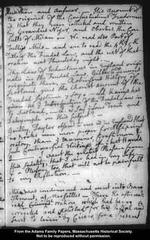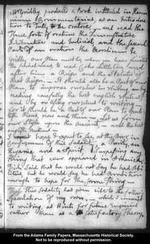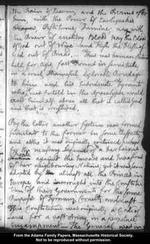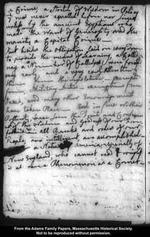Front Cover
Inside Front Cover
SODALITAS, A CLUBB OF FRIENDS.
[This heading suggests that JA planned to keep a separate record of the proceedings of this lawyers' study club. But after a few entries in Jan.-Feb. 1765 and some fragments of a first draft of his essay on canon and feudal law, written for the club, the record ends. ]
Page 1
1765. JANY. 24TH. THURDSDAY.
Soon after I got to Boston, at Jany. Court Mr. Fitch came to me upon Change, and told me, that Mr. Gridley and he had something to communicate to me, that I should like, in Sacred Confidence however. I waited on Mr. Gridley, at his office, (after many Conjectures what the secret might be) and he told me, That He and Mr. Fitch had proposed a Law Clubb -- a private Association, for the study of Law and oratory. -- As to the Bar, he thought of them, as he did think of them Otis, Thatcher, Auchmuty. He was considering, who was for the future to support the Honour and Dignity of the Bar. And he was determined to bring me into Practice, the first Practice, and Fitch too. He could easily do it, by recommending. And he was very desirous of forming a junto, a small sodality, of himself and Fitch and me, and Dudley if he pleased might come, in order to read in Concert the Feudal Law and Tullies orations. And for this Purpose he lent me, the Corpus Juris Civilis in 4 Partes distinctum, eruditissimis Dionysii Gothofredi J.C. clarissimi notis illustratum, at the End of which are the Feudorum Consuetudines Partim ex Editione vulgata partim ex Cujaciana vulgata, appositae, as also the Epitome Feudorum Dionysio Gothofredo Authore.
We accordingly agreed to meet the next Evening in one of Ballards back Chambers and determine upon Times, Places, and studies.
Page 2
We accordingly met the next Evening, Mr. Gridley, Fitch and I, and spent the whole Evening. Proposals were to read a Reign and the statutes of that Reign, to read
Hurds Dialogues and any new Pieces. But at last we determined to read The Feudal Law and Cicero only, least we should loose sight of our main Object, by attending to too many.
Thurdsday Nights were agreed on, and to meet first at Mr. Gridleys office. There we accordingly met on the
Thurdsday Night following, and suffered our Conversation to ramble upon Hurds Dialogues, the Pandects, their Discovery in Italy by Lotharius in 1127, in the Reign of Stephen, upon Lambard de priscis Anglorum Legibus, in Saxon and Latin, upon Ld. Kaims
[Kames], Mr. Blackstone &c. But we agreed to meet the next
Thurdsday night at Mr. Fitch's, and to read the Three first Titles of the feudal Law, and Tullies oration for Milo.
THURDSDAY JANUARY 24TH. 1765.
I rode to Boston on Purpose to meet at Fitchs. Gridley came. We read the 3 first Titles of the feudal Law, and We read
Gothofreds Notes and We looked into
Strykius for the Explanation of many hard Words in those 3 Titles-The Valvasors, Capitanii, Guardia and Guastaldi. This Strykius wrote an Examen Juris feudalis, by Way of
Page 3
Question and Answer. His account of the original of the Consuetudines Feudorum is, that they were collected and written by Gerardus Niger, and Obertus, the Consulls of Milan. -- We read also Part of Tully's Milo-and are to read the 4th. and 5th Title of The Feudal Law, and the rest of that oration next
Thurdsday night.
The Law of Inheritances in England originates in the Feudal Law. Gilberts Tenures originate there. Robinsons History of Scotland gives the clearest account of the Feudal system they say. Ld. Kaims has given us the Introduction of the Feudal Law in to Scotland. -- Q. What say the Law Tracts and Dalrymple on this subject?
Gridley. Taylor observed to me when in England that no Books were more proper for Nisi prius oratory, than the Examiner, Craftsman and such Controversial Writings of the best Hands.
I expect the greatest Pleasure from this sodality, that I ever had in my Life -- and a Pleasure too, that will not be painfull to my Reflection.
Milo was condemned and went into Banishment, at Marseilles. There He afterwards read
Cicerothe oration, which had been corrected and polished for his Perusal and sent to him by Cicero, for a Present
Page 4
and an Amusement. Reading it, he broke out "si sic ejecisses Marce Tulli barbatos Pisces non comedissem"
[Various versions of this incident are recorded. According to JA's text, Milo said: "If you had thus delivered [your speech in my favor], Marcus Tullius, I would not have eaten bearded fishes [in Marseilles]."] -- for he had been eating a sort of bearded Fishes, that he found at Marseilles.
THURDSDAY. JANY. 31 ST.
The snowy Weather prevented me from going to Dudleys. The Sodality however met and read the two Titles assigned, and assigned the three next vizt. the 6th. Episcopum, vel Abbatem vell Abbatissam, vel Dominum plebis feudum dare non posse. Tit. 7th. De Natura Feudi, and Tit. 8th. De successione Feudi.
THURDSDAY. FEBRUARY 21ST. 1765.
At Boston, entertained the Sodality at Blodgets. We were never in better Spirits, or more Social. We began the 13th. Title of the feudal Law De Alienatione Feudi and read three Titles. Gridley proposed that we should mark all those Passages, which are adopted by the English Law, that when we come to read Ld. Coke we may recur back upon Occasion, to the originals of our Law.
The14th. Title is De Feudo Marchiae, vel Ducatus vel Comitatus. Here therefore we see the originals of English Dignities, Marquisates, Dukedoms, Countys &c. The 15th. Title is an Maritus succedat Uxori in Feudo.
I quoted to my Brothers, the Preface to the Historical Law Tracts, "The feudal Customs ought to be the
Page 5
Study of every Man, who proposes to reap Instruction from the History of the modern European Nations, because among these Nations, public Transactions not less than private Property, were some Centuries ago, regulated by the Feudal system. Sovereigns formerly were many of them connected by the Relation of
Superiour and Vassal. The King of England, for Example, by the feudal Tenure, held of the french King many fair Provinces."
I quoted also the sentiments of Rosseau, which are very inimical to the Feudal system. -- "The Notion of Representatives, says he, is modern, descending to us, from the Feudal system, that most iniquitous and absurd Form of Government by which human Nature was so shamefully degraded."
Fitch. The Feudal system was military. It was a martial system-- a set of Regulations (as Robinsons calls it) for the Incampment of a great Army-and it was a wise and good system, for a martial People in such Circumstances. For the feudal Connections and subordination, and services, were necessary for their Defence against the Inroads and Invasions of their Neighbours, &c.
Ego. I think that the Absurdity and Iniquity lies in this, that Nations at Peace and in Plenty who live by Commerce and Industry, have adopted such a system.
Page 6
Gridley. T here lies the Absurdity and Iniquity. And the observation you quote proves that Rosseau is shallow.
I might have quoted Ld. Kaims's British Antiquities, who says --"It is the Plan of the feudal Law to bestow the whole Land property upon the King and to subject to him the Bulk of the People, in Quality of Servants and Vassals; a Constitution so contradictory to all the Principles which govern Mankind can never be brought about, one should imagine, but by foreign Conquest, or native Usurpation." And in another Place he calls the feudal connection, the feudal Yoke.
These Epithets of absurd, iniquitous, unatural &c. are not very agreable to the Opinion of Strykius, who says in answer to the Question Unde Originem trahunt Feuda?-Certo modo et si formam feudorum genericam consideres, dici potest ex Jure Gentium. Hoc enim ratio naturalis, juncta necessitate publica, exigit, ut militibus potissimum Praedia, ab Hostibus occupata, pro bene meritis concederentur sub Conditione tamen fidelitatis, quo eo securior esset Respublica, et ad Patriam defendendam magis allicerentur.
In Milo We read from the 27th. to the 34th section in Davidsons Translation. We begin the Peroration next. We had Guthries and Davidsons Translations. In Point of Accuracy And Spirit Davidson's is vastly Superiour.
Page 7
Mr. Gridley produced a Book intituled in Herennium Commentarius, as an Introduction to Tully De Oratore-and read the Three sorts of orations, the Demonstrative, Deliberative and judicial, and the several Parts of an oration, the Exordium &c.
Gridley. Our Plan must be, when we have finished the feudal Law, to read Coke Littleton, and after him a Reign and the Statutes of that Reign. It should also be a Part of our Plan, to improve ourselves in Writing, by reading carefully the best English Writers, and by Using ourselves to writing-- for it should be a part of our Plan to publish Pieces, now and then. Let us form our Style upon the Ancients, and the best English Authors.
I [illegible] hope and expect to see, at the Bar, in Consequence of this Sodality, a Purity, an Elegance, and a Spirit, surpassing any Thing that ever appeared in America. Fich [Fitch] said that he would not say he had Abilities, but he would say he had Ambition enough to hope for the same Thing.
[ FRAGMENTARY DRAFT OF A DISSERTATION ON CANON AND FEUDAL LAW, FEBRUARY 1765.]
[The following paragraphs are an early draft of an essay later published in the Boston Gazette in four parts, 12 and 19 Aug., 30 Sept., and 21 Oct. 1765.] This Sodality has given rise to the following Speculation of my own, which I commit to writing, as Hints for future Enquiries rather than as a satisfactory Theory.
Page 8
The Desire of Power Power Dominion, that encroaching, grasping, restless, and ungovernable Principle in human Nature, that Principle which has made so much Havock and Desolation, among the Works of God, in all the Variety of systems, that have been invented, for its Gratification, was never so successfull, as in the Invention and Establishment of the Cannon and the Feudal Law. -- By the former the most refined, sublime, extensive, and astonishing Constitution of Policy, that was ever conceived by the Human Mind, was framed, by the Romish Clergy, for the Aggrandisement of their own order. This Constitution will be allowed to deserve all the Epithets I have given it, when it is considered, that they found Ways to make the World believe that God had entrusted them with Keys of Heaven whose Gates they might open and shut at Pleasure, and with the Power of Dispensation over all the Rules and Types of Morality, the Power of licensing all sorts both of sins and Crimes, with the Power of Deposing Princes, and absolving all their subjects from their Subj Allegiance, with the Power of Procuring or withholding
Page 9
the Rain of Heaven, and the Beams of the Sun, with the Power of Earthquakes,
Plagues, Pestilence, Famine; nay with the Power of creating Blood Nay the Blood of God out of Wine, and Flesh the Flesh of God out of Bread. Thus was human Nature held for Ages, fast Bound in servitude, in a cruel, shameful, deplorable Bondage to him and his subordinate Tyrants who
it was fortold in the Apocalypse, would exalt himself above all that is called God and that is worshiped.
By the latter another system was formed similar to the former in some Respects, and altho it was originally contrived perhaps for the necessary Defence of a barbarous Nation People against the Inroads and Invasions of her neighbouring Nations; yet it was soon adopted by almost all the Princes in Europe, and wrought into the Constitution of their Governments for the same Purposes of Tyranny, Cruelty and Lust. This Constitution was originally a Code of Laws for a vast Army, in a perpetual Encampment. The General was in
Page 10
vested with the Property of all the Land within [sentence unfinished]
2
Canon & feudal law
It was a Resolution formed by a sensible People almost in despair. [The Puritans' decision to leave England and settle in America.] They Puritans had become intelligent in general, and some of them learned but they had been galled, and fretted, and whipped and cropped, and hanged and burned. In short they had been so worried by Plagues and Tortures in every Shape, and they utterly despaired of Deliverance from these Miseries in their own Country, that they at last resolved to fly to the Wilderness, for Refuge from the temporal and spiritual Principalities and Powers, and Plagues and scourges of their Native Country.
After their Arrival here, they began their settlements and pursued their Plan both of Ecclesiastical and Civil Government in direct Opposition to the Cannon And the feudal systems.
Their first Concern was to preserve and
Page 11
propagate Knowledge. The leading Men among the first Settlers of America, were Men of sense and Learning. And the Clergymen, who came over first, were
[illegible] familiar with the Historians, Orators, Poets and Phylosophers of Greece and Rome, and many of them have left behind them Libraries which are still in Being consisting chiefly of Books, whose Character their great Grand sons can scarcely read.
I always consider the settlement of America with Reverence and Wonder-- as the Opening of a grand scene and Design in Providence, for the Illumination of the Ignorant and the Emancipation of the slavish Part of Mankind all over the Earth.
their great grand sons, tho educated at European Universities, can scarcely read. Archbishop King him self, (I think it was, for I say this upon Memory) observed of the Puritans in General, that they were much more intelligent, and better read than the Members of the Church whom he reproaches, and censures very warmly for that Reason.
Provision was early made by Law, that every Town should be accommodated with a grammar school-under a severe Penalty-- so that even Negligence of Learning was made
Page 12
a Crime, a Stretch of Wisdom in Policy that was never equalled before nor since unless by the ancient Egyptians who made the Want of Generosity and Humanity a Capital Crime.
But besides the Obligation laid on every Town to provide the means of Learning, a Colledge nay a Number of Colledges were formed very early, and a very early Attention to them from the Legislature, exempted from Military Duties-- exemptions from Taxes, and many other Encouragements have taken Place. And in fine We their Posterity, have seen the Fruits and Consequences of the Wisdom and Goodness of our Forefathers. All Ranks and orders of our People, are intelligent, are accomplished-- a Native of America, especially of New England, who cannot read and wright is as rare a Phenomenon as a Comet.
Page 13
Remainder of the Piece begun in our last.
Thus accomplished were the first Settlers of these Colonies-- and as has been said, Tyranny in every shape, was their Disdain and Abhorrence. No Kind of Fear of Punishment not even of Death itself, in exquisite Torture had been sufficient to conquer that steady, manly, pertinacious Spirit, with which they opposed the Tyrants of those Days in Church and state. And their greatest Concern seems to have been to establish a Government of the Church, more consistent with the scriptures, and a Government of the state more agreable to the Dignity of human Nature, than they had ever seen in Europe. For this purpose They knew that beautiful were the feet &c. But They saw clearly, that of all the ridiculous Nonsense, Delusion, and Frenzy that had ever passed thro the Mind of Man, none had ever been more glaring and extravagant than the Notions of the Cannon Law, of the indellible Character, the perpetual succession, the virtuous and sanctified Effluvia from Episcopal Fingers, and all the rest of that
Page 14
dark Ribaldry which had thrown such a Glare of
Mistery, Sanctity, Reverence and Right Reverence, Eminence and Holiness around the Idea of a Priest [sentence unfinished]
Page 15
[This entry appears on several loose folded pages inserted into Diary 10.] AUGUST 15TH. 1765
I hope it will give no offence, to enquire into the Grounds and Reasons of the strange Conduct of Yesterday and last Night, at Boston. Is there any Evidence, that Mr. Oliver ever wrote to the Ministry, or to any Body in England any unfavourable Representations, of the People of this Province? Has he ever placed the Character of the People, their Manners, their Laws, their Principles in Religion or Government, their submission to order and Magistracy, in a false Light?
Is it known that he ever advised the Ministry to lay internal Taxes upon Us? That he ever solicited the office of Distributer of Stamps? or that he has ever done any Thing to injure the People, or to incur their Displeasure, besides barely accepting of that office? If there is no Proof at all of any such Injury done to the People by that Gentleman, has not the blind, undistinguishing Rage of the Rabble done him, irreparable Injustice? To be placed, only in Pageantry, in the most conspicuous Part of the Town, with such ignominous Devices around him, would be thought severity enough by any Man
Page 16
of common sensibility: But to be carried
thro the Town, in such insolent
Tryumph and burned on an Hill, to have his Garden torn in Pieces, his House broken open, his furniture destroyed and his whole family thrown into Confusion and Terror, is a very attrocious Violation of the Peace and of dangerous Tendency and Consequence.
But on the other Hand let us ask a few Questions. Has not his
Honour the Lieutenant Governor discovered to the People in innumerable Instances, a very ambitious and avaricious Disposition? Has he not grasped four of the most important offices in the Province into his own Hands? Has not his Brother in Law Oliver another of the greatest Places in Government? Is not a Brother of the Secretary, a Judge of the
Superiour Court? Has not that Brother a son in the House? Has not the secretary a son in the House, who is also a judge in one of the Counties? Did not that son marry the Daughter of another of the judges of the
Superiour Court? Has not the Lieutenant Governor a Brother, a Judge of the Pleas in Boston? and a Namesake and near Relation who is
Page 17
another judge? Has not the Lieutenant Governor a near Relation who is Register of his own Court of Probate, and Deputy Secretary? Has he not another near Relation who is Clerk of the House of Representatives? Is not this amazing ascendancy of one Family,
enough Foundation sufficient on which to erect a Tyranny? Is it not enough to excite jealousies among the People?
Quere further. Has not many a Member of both Houses, laboured to the Utmost of his Ability, to obtain a Resolution to send home some Petitions and Remonstrances to the King, Lords and Commons vs. the Impositions they saw were about to be laid upon Us. Has not the Lieutenant Governor all along been the very Gentleman who has prevented it, and wiped out every spirited, if not every sensible Expression out of those Petitions?
Quaere further. When the Court was about to choose an Agent, did not the Governor, Lieutenant Governor, and Secretary, make Use of all their Influence to procure an Election for
Mr. Jackson? Was not Mr. Jackson
[ . . . ]
Page 18
a secretary to Mr. Greenville? Was not Mr. Greenville, the Author of the late Measures relative to the Colonies? Was not Mr. Jackson an Agent and a particular Friend of the Governor? Was not all this considering the natural jealousy of Mankind, enough to excite suspicions among the Vulgar, that all these Gentlemen were in a Combination, to
favour the Measures of the Ministry, at least to prevent any Thing from being done here to discourage the Minister from his rash, mad, and Dogmatical Proceedings?
Would it not be Prudence then in those Gentlemen at this alarming Conjuncture, and a Condescention that is due to the present Fears and Distresses of the People, (in some manner consistent with the Dignity of their stations and Characters,) to remove these jealousies from the Minds of the People by giving an easy solution of these Difficulties?
Page 19
Pages 20 - 21
[Blank pages -- no images available]
Page 24, upside down
[These notes appear on several loose folded pages inserted into Diary 10. (This sequence of pages also includes the entry for 15 August 1765.) The following three pages are presented in reverse order because John Adams flipped the folded pages and began the notes relating to the legal case of Hannah Place. ] [AUGUST 1765.]
Hannah Place vs. Atwood.
Introduced into the family at 13. Constant Understanding that she should be paid. A Pittance left to 'em by their Uncle. He [cutt?]. No particular Bargain for Wood or service.
Hannah Atwood. Had one of em constantly as a Maid. My Husband promised to pay her. The fore part of the Time Mary worked, the latter Hannah. Hannah worked but very little abroad the whole Time. She did some. They told me, both could not leave home at once. [illegible] They bought their own Cloaths. From 47 to 56.
Richd. Mayberry. They worked at taylering for me. I paid em in sugar and Tea. I've seen them washing and laboring. And sowing seeds in Garden.
Daniel Barrows. About House work, fetching Water and Washing -- no other Help.
Eliz. Halloway. Seen em Milking, Washing, Ironing, Baking. 3 of em lived there. Went out and took in Work.
Susannah Jones.
Wm. Halloway. Molly was weakly and made this her Home.
Eliz. Place. Father in Law employed one of my sisters constantly as a Maid and said he would pay her
Page 23, upside down
and all the rest of us were welcome to live there. Molly uneasy. He said his Word as good as the Bank. He found Room and Wood, and Provisions. Father borrowed the Wood of sister Hannah, to buy his Grave stones, pay her the Wood or the Money.
[illegible] Hired some Washing.
Abiel Whitmarsh. Something of an Account.
George Hallowell. Got me to milk.
George Ware. Conversation with Atwood about pay for Doctering. Chose to know what it is. Said he would agree with them and leave it to Men. Have known them to buy some Tea &c.
Paine. Troublesome family. No troublesome Company. -- Family Witnesses.
White. Younger sister Elder sister.
Witnesses.
Joseph Atwood. They worked out. [illegible] The old Lady used to be the Maid, in the family. Never heard of any pay. Old Gentleman in kitchen. Weakly. Within 6 Year. My maid often sent for to help her up.
David Walker. They took several suits of Cloaths home. Never mistrusted their being Maids.
Page 22, upside down
John Camp. Lived there 10 Year.
Pages 25 - 54
[Blank pages -- no images available]
Inside Back Cover
[Blank page -- no image available]
Back Cover
[Blank page -- no image available]






















